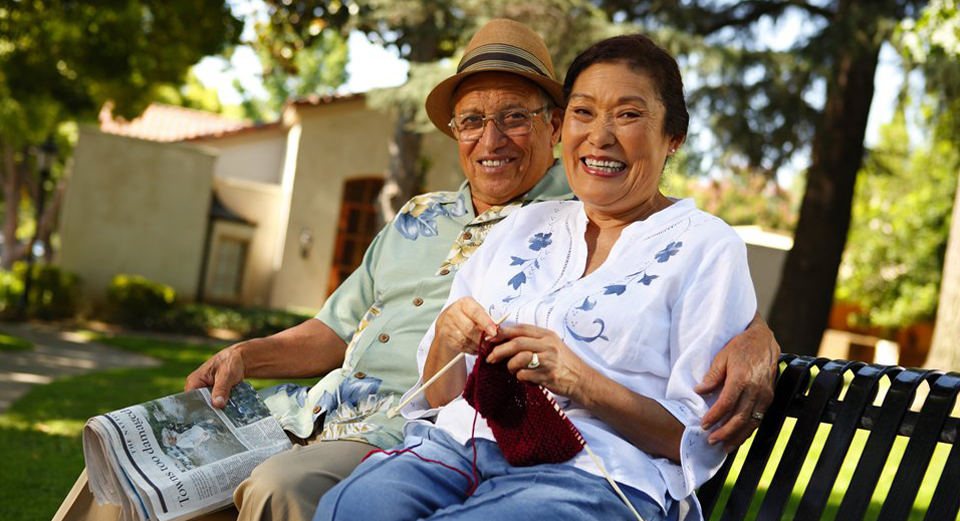Kaiser Permanente South San Francisco physician Russ Granich, MD, discusses how to determine when older adults need your help — and finding the care that’s right for them.
It’s one of life’s most poignant transitions: After years of being cared for by our parents, there comes a time when we need to care for them.
We spoke with Russ Granich, MD, chief of Geriatric Medicine at Kaiser Permanente South San Francisco, about deciding when that time has come and finding the best care option. Dr. Granich is the Northern California lead for Skilled Nursing, Home Health, and Elder Care.

What are the signs that an older person can’t live independently?
The basic rule is that when someone can’t care for themselves, they need help. Their challenges may be physical — such as trouble walking or using the toilet — or due to confusion, such as in dementia. In early dementia, people can often live by themselves, but there comes a point where they can be a danger to themselves by doing things like forgetting to turn off the stove. Another consideration is folks who use poor judgment: Someone who needs a walker but refuses to use it is at high risk of falling and fracturing a hip.
Is keeping a senior at home an option?
Yes, and that’s generally best because it’s where they feel most comfortable. Adjusting to a new environment is hard for someone who is losing their vision or memory. Caregivers can be hired to help with care from a few hours a day to 24/7. They can help with everything from giving medication to bathing, dressing, and driving.
Two options for finding at-home care are to use an agency or hire someone privately. Agency care is more expensive, but providers are insured and undergo a criminal background check.
What care options are available for people who can’t stay at home?
Residential care facilities are the next level of care.
At an independent living facility, seniors typically have their own space with a kitchen and bathroom. Many offer housekeeping, meals, transportation, and activities.
Assisted living facilities and board and care homes provide meals, 24-hour supervision, medication management, and help with activities like bathing, dressing, and eating. They range in size from a few residents to hundreds.
Make sure that the facility you select will meet your parent’s changing needs. Ask about the cost of additional services, such as incontinence care, and if they can accommodate hospice patients. Consider the social aspect too: Would your parent like a larger facility with activities or a smaller, homelike environment?
A skilled nursing facility (SNF) is the next level, and there are two types of residents. Some patients are there short term to build up their strength or get services that require skilled care, such as IV fluids, tube feeding, and wound management. Many seniors will transition from the hospital to a SNF for this type of care.
The other type of resident is there long term — the SNF becomes their home. SNFs can supply any type of care needed, including care for someone totally dependent on others.
Will insurance help cover the costs of care?
Unless a senior has long-term care insurance, at-home and residential care are not covered by insurance.
Skilled nursing care at a SNF is usually covered by health insurance for a maximum of 100 days, as long as the person requires skilled care. Long-term custodial care at a SNF is not covered by health insurance, but low-income seniors who need help with activities of daily living may qualify to live in a nursing home as Medi-Cal patients.
Visit these websites to learn more: California Advocates for Nursing Home Reform, California Department of Aging Long-Term Care Ombudsman Program, and Family Caregiver Alliance.





This Post Has 8 Comments
I liked that you mentioned keeping a senior at home is a good option because the will feel more comfortable. My husband and his brother are thinking about how to take care of their grandmother, and we are looking for advice. I believe that hiring someone to help them taking care of their grandmother will be a great option to keep her at home.
I like how you said that the basic rule is that when someone can’t care for themselves, they need help. My grandma is having a hard time caring for herself lately and we are thinking of home health care. Thanks for the tips on caring for aging parents.
Very important topic that is affecting more families every day and can be financially devastating. An option that was not mentioned that can be very helpful to remain at home when either physical or cognitive deficits make it difficult or unsafe is adult day or adult day health care. Whether it is 1 or 5 days/week, the frail elder or dependant adult is transported by bus to and from home, and provided a hot meal, activities, socialization, even medication and therapy. This is an important program that combats the isolation, depression and concerns for safety when a person becomes more homebound and can successfully delay or prevent institutionalization.
Thank you for this article. The issue of elder care is enormous. Many of us deal with this on a daily basis and it does help to receive information of any type that can offer information and or support that lets us know we are not alone.
On their request, my husband and I moved into my parents home to help care for them. Mom is Hemiplegic (right side gone since major stroke four years ago) and Dad is generally fully mobile with lapses of confusion and instability. There is coordination of care with a sister and a niece. … [does] Kaiser offer some resources for family members who are sometimes at their wits end for a place to vent, or to go for suggestions ….. or plain ole somewhere we can ask questions so we don’t feel all alone…?
From Dr. Granich: It sounds like a difficult situation. One KP resource is the social worker who works with the PCPs. They can point you in the right direction and are familiar with any Kaiser programs in your area as well as providing a shoulder to lean on. A Palliative Medicine consultation can also help. One of their roles is to provide support and help families gain better understanding and insight. The Family Caregiver Alliance offers several online support groups for caregivers, including The Caregiver Online Group, an unmoderated group for families, partners and other caregivers of adults with disorders such as Alzheimer’s, stroke, brain injury and other chronic debilitating health conditions.
The brief article about Caring for Aging Parents was very superficial. Most people know this information already. I think a better focus would have been to talk about strategies for caring for aging parents at home. Most average people cannot afford help or facilities. The article should also talk about managing the stress of caring for elderly people at varying levels of competence.
From Dr. Granich: The article is meant as a broad overview and we were limited in how much content we could have. Delving into more specific areas is a great idea for a future article. One resource you may find useful is the Family Caregiver Alliance, a nonprofit organization created “to address the needs of families and friends providing long-term care for loved ones at home” through “education, services, research and advocacy.”